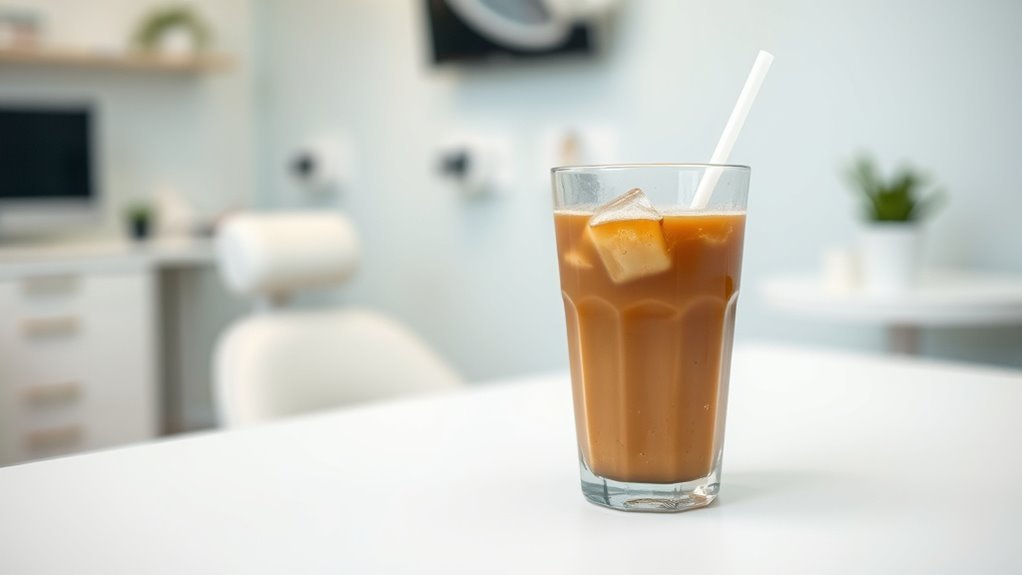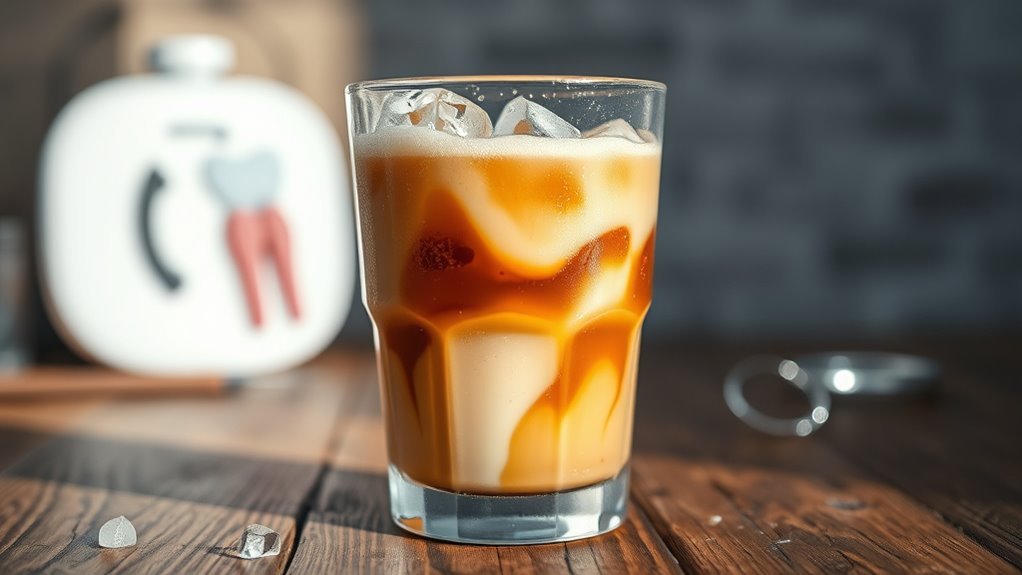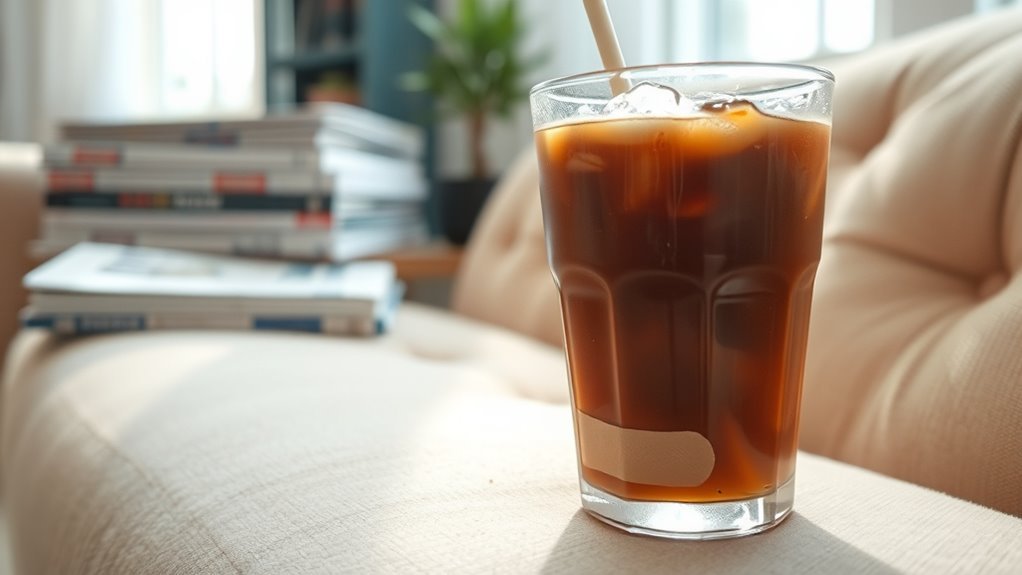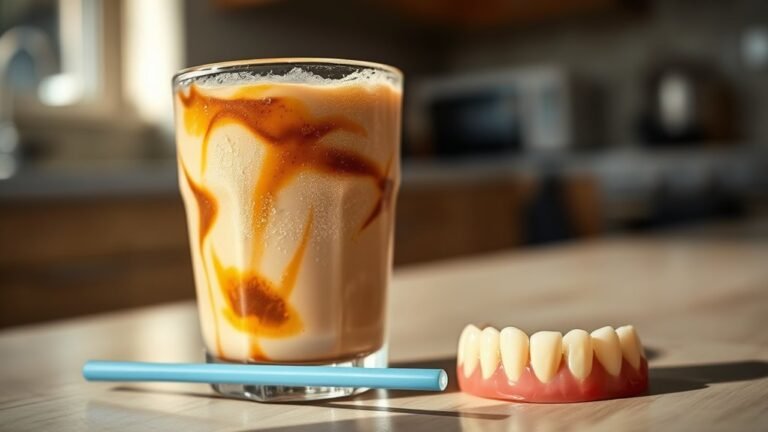Can You Drink Cold Coffee After Wisdom Teeth Removal
After wisdom teeth removal, you can drink cold coffee, but exercise caution. Cold beverages may cause discomfort due to heightened sensitivity in your gums. Opt for cold brew, which is gentler on your healing mouth, and make certain it’s not too cold. Monitor your caffeine intake and consider decaf options. Be aware of added ingredients, as dairy and sugars can irritate. For a safer experience, learn more about dietary choices that support your recovery.
Understanding the Healing Process After Wisdom Teeth Removal

After having your wisdom teeth removed, it’s important to understand the healing process to guarantee a smooth recovery. The healing timeline typically spans several days to weeks, with most swelling and discomfort peaking within 48 hours. Effective pain management is vital during this period; over-the-counter pain relievers can help mitigate discomfort. You’ll likely experience varying levels of soreness, which should gradually diminish. It’s important to monitor your symptoms and reach out to your dentist if severe pain or prolonged swelling occurs. Staying informed about the healing process empowers you, enabling you to take proactive steps in your recovery, ensuring you return to your normal routine as quickly and safely as possible.
The Importance of Post-Operative Diet
While your body focuses on healing after wisdom teeth removal, maintaining a proper post-operative diet is essential for a smooth recovery. Your diet should primarily consist of soft foods, which are easier to chew and less likely to irritate your healing gums. Foods like yogurt, smoothies, and mashed potatoes can provide necessary nutrients without causing discomfort. Additionally, hydration importance can’t be overstated; drinking plenty of fluids helps your body recover and prevents dehydration, which can complicate healing. Aim to consume water, broths, and electrolyte-rich drinks. Avoiding hard, crunchy, or spicy foods during this period will greatly aid your recovery process, allowing you to regain your strength and comfort more quickly. Prioritize these dietary choices for ideal healing.
Effects of Cold Beverages on Recovery

Although many patients may crave cold beverages post-surgery, it’s important to understand their effects on recovery. Cold drinks can provide temporary relief by aiding swelling reduction, as the cool temperature helps constrict blood vessels and minimize inflammation. However, be cautious if you experience heightened nerve sensitivity after your procedure; cold beverages may exacerbate discomfort in sensitive areas. While enjoying a chilled drink might seem appealing, you should monitor your body’s response. If you feel increased pain or discomfort, it’s wise to opt for room temperature alternatives. Ultimately, your recovery is paramount, so prioritize choices that support healing while still allowing you some freedom in what you consume. Always consult your dental professional for personalized advice.
Cold Coffee and Its Ingredients
Cold coffee, often enjoyed for its revitalizing taste, can contain various ingredients that may impact your recovery after wisdom teeth removal. It’s crucial to be aware of these components, especially regarding their caffeine content and potential effects on healing.
Consider these common ingredients in cold coffee:
- Cold brew coffee: Typically lower in acidity, it may be gentler on your healing gums.
- Milk or cream: Dairy can cause mucus buildup, which might irritate your throat.
- Sweeteners: Sugar can promote inflammation, so moderation is key.
- Flavorings: Additives like syrups may contain acids that could irritate your mouth.
Understanding these ingredients can help you make better choices during your recovery period.
Recommendations for Enjoying Cold Coffee Safely

To guarantee a safe and enjoyable experience with cold coffee after wisdom teeth removal, it’s important to take into account both the temperature and the ingredients. Cold brew can be a gentler option since its lower acidity may be easier on your healing gums. Make sure that your cold coffee is at a safe temperature; it shouldn’t be too cold, as extreme temperatures can cause discomfort. Additionally, monitor your caffeine intake, as caffeine effects can vary between individuals. Too much caffeine may complicate your recovery. Opt for decaffeinated options or limit your servings. Always consult your dentist before introducing cold coffee into your diet post-surgery, making certain it aligns with your recovery goals. Your comfort and healing should be the primary focus.
Frequently Asked Questions
Can I Have Iced Coffee if I’M on Pain Medication?
If you’re on pain medication, it’s important to evaluate the effects of caffeine intake. While iced coffee might seem invigorating, caffeine can interact with certain medications, potentially increasing side effects like jitteriness or affecting your pain relief. It’s best to consult with your healthcare provider to guarantee that your iced coffee habit won’t interfere with the treatment. Prioritizing your recovery is key, so make informed choices that support your healing process.
Will Cold Coffee Affect My Stitches After Surgery?
Cold coffee might not directly affect your stitches, but be cautious. Cold sensitivity can lead to discomfort around the surgical site, which could complicate your stitch care. It’s important to avoid anything that might irritate the area while it’s healing. If you experience pain or swelling after consuming cold beverages, it’s best to switch to warmer options until your mouth has fully recovered. Always consult your dentist for personalized advice.
How Long Should I Wait to Drink Cold Coffee?
Imagine your mouth as a delicate garden after a rainstorm; you wouldn’t rush to trample through it. Similarly, during your post-surgery recovery, it’s best to wait at least 48 to 72 hours before sipping cold coffee. This allows your stitches to settle and reduces the risk of complications. While caffeine intake can be tempting, giving yourself time guarantees a smoother healing process, letting that garden flourish without disturbance.
Can I Add Sugar or Cream to My Cold Coffee?
You can add sugar or cream to your cold coffee, but consider using sugar alternatives like stevia or monk fruit if you’re watching your sugar intake. For cream, there are plenty of cream substitutes like almond milk or oat milk that can provide a similar texture without the heaviness. Just be mindful of your preferences and dietary needs, ensuring that whatever you choose enhances your experience without causing discomfort or adverse reactions.
What if I Experience Sensitivity While Drinking Cold Coffee?
If you feel sensitivity while drinking cold coffee, it’s vital to address that discomfort. Sensitivity management can involve opting for warmer beverages or room-temperature drinks, which might be more soothing. Cold drink alternatives, like herbal teas or warm broths, can provide comfort without triggering sensitivity. Always listen to your body’s signals; if the pain persists, consulting your dentist for personalized advice is wise. Your well-being should always come first.






